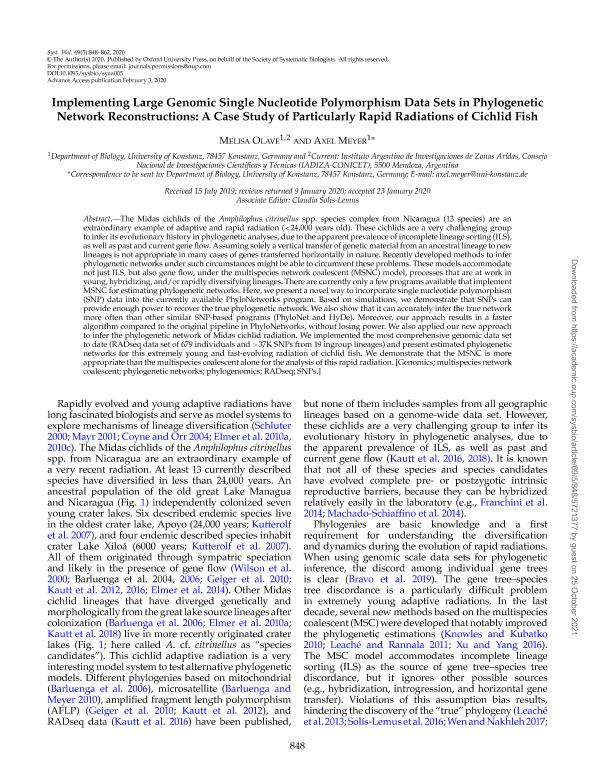Artículo
Implementing large genomic single nucleotide polymorphism data sets in phylogenetic network reconstructions: A case study of particularly rapid radiations of cichlid fish
Fecha de publicación:
03/02/2020
Editorial:
Oxford University Press
Revista:
Systematic Biology
ISSN:
1063-5157
Idioma:
Inglés
Tipo de recurso:
Artículo publicado
Clasificación temática:
Resumen
The Midas cichlids of the Amphilophus citrinellus spp. species complex from Nicaragua (13 species) are an extraordinary example of adaptive and rapid radiation (<24,000 years old). These cichlids are a very challenging group to infer its evolutionary history in phylogenetic analyses, due to the apparent prevalence of incomplete lineage sorting (ILS), as well as past and current gene flow. Assuming solely a vertical transfer of genetic material from an ancestral lineage to new lineages is not appropriate in many cases of genes transferred horizontally in nature. Recently developed methods to infer phylogenetic networks under such circumstances might be able to circumvent these problems. These models accommodate not just ILS, but also gene flow, under the multispecies network coalescent (MSNC) model, processes that are at work in young, hybridizing, and/or rapidly diversifying lineages. There are currently only a few programs available that implement MSNC for estimating phylogenetic networks. Here, we present a novel way to incorporate single nucleotide polymorphism (SNP) data into the currently available PhyloNetworks program. Based on simulations, we demonstrate that SNPs can provide enough power to recover the true phylogenetic network. We also show that it can accurately infer the true network more often than other similar SNP-based programs (PhyloNet and HyDe). Moreover, our approach results in a faster algorithm compared to the original pipeline in PhyloNetworks, without losing power. We also applied our new approach to infer the phylogenetic network of Midas cichlid radiation. We implemented the most comprehensive genomic data set to date (RADseq data set of 679 individuals and >37K SNPs from 19 ingroup lineages) and present estimated phylogenetic networks for this extremely young and fast-evolving radiation of cichlid fish. We demonstrate that the MSNC is more appropriate than the multispecies coalescent alone for the analysis of this rapid radiation.
Archivos asociados
Licencia
Identificadores
Colecciones
Articulos(IADIZA)
Articulos de INST. ARG DE INVEST. DE LAS ZONAS ARIDAS
Articulos de INST. ARG DE INVEST. DE LAS ZONAS ARIDAS
Citación
Olave, Melisa; Meyer, Axel; Implementing large genomic single nucleotide polymorphism data sets in phylogenetic network reconstructions: A case study of particularly rapid radiations of cichlid fish; Oxford University Press; Systematic Biology; 69; 5; 3-2-2020; 848-862
Compartir
Altmétricas




